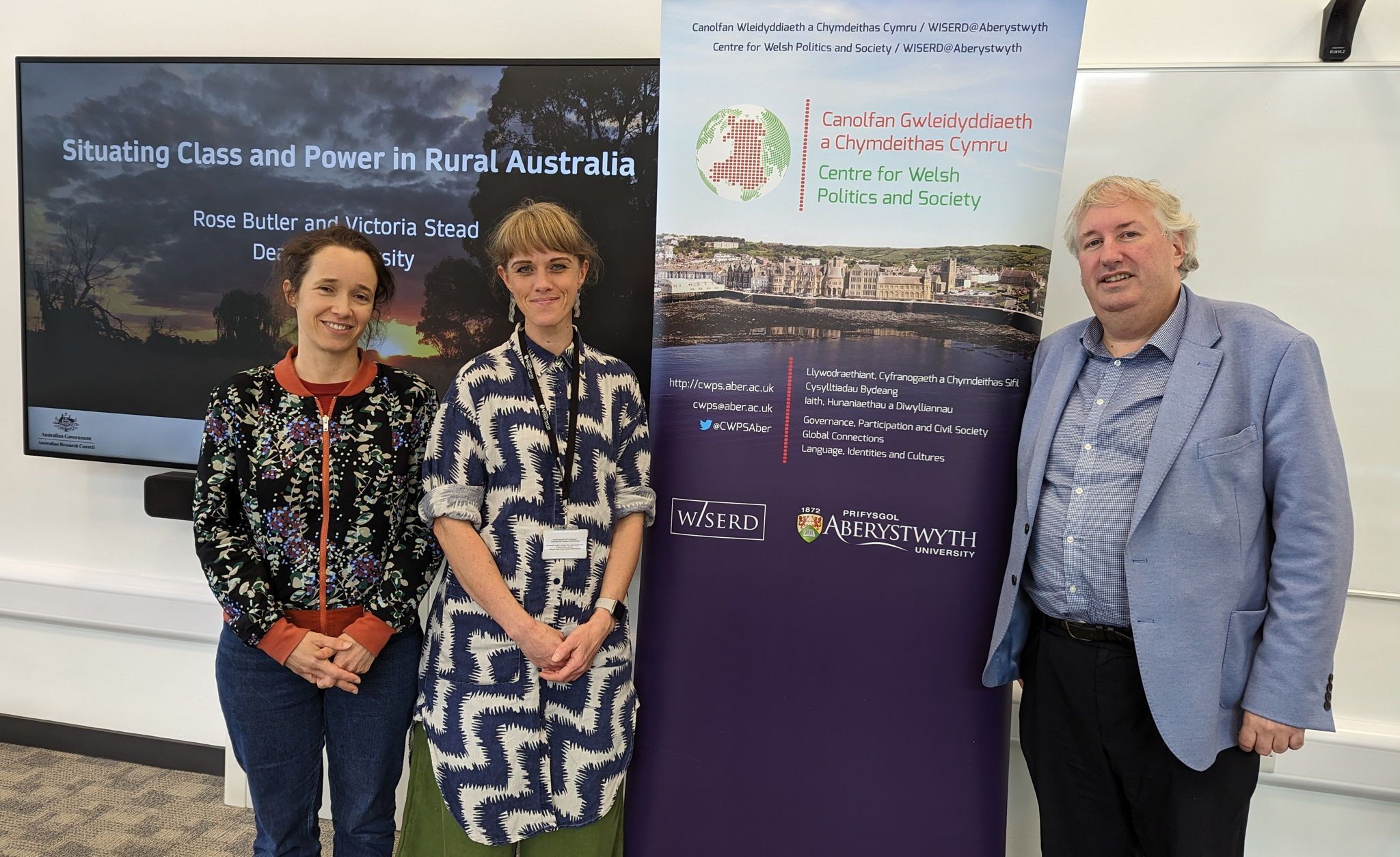Mae'r cynnwys hwn ar gael yn Saesneg yn unig.
Pictured above: Dr Rose Butler and Dr Victoria Stead, Deakin University, Australia with Professor Michael Woods, Aberystwyth University. Dr Rose Butler and Dr Victoria Stead kindly contributed to the WISERD blog following their visit to Wales from 1–8th October, 2023.
We were thrilled to spend a week as guests of the Wales Institute for Social and Economic Research and Data (WISERD), and the Department of Geography and Earth Sciences at Aberystwyth University. Our visit to Aberystwyth followed on the back of an ongoing collaboration with Professor Michael Woods, which first began in 2021 with Mike’s participation in an international workshop we led with Deakin University colleague Dr Christopher Mayes, on ‘Race and Place-Making in the Rural Global North’.
This event brought together an interdisciplinary team to think critically about the role of race and coloniality in the making of rural places. This included esteemed colleagues whose work has deeply shaped our thinking in this area including Professor Sandrina de Finney (University of Victoria, Canada), Assistant Professor J. T. Roane (Rutgers University), Professor Barbara Pini (Griffith University) and Professor Woods, alongside emerging scholars Dr Laura Rodriguez Castro (Southern Cross University) as well as Associate Professor James Oliver (RMIT University) and Shiraz Bayoo (artist and filmmaker).
Building on this generative event and interdisciplinary exchange, we co-edited a special issue of the Journal of Rural Studies, published in early 2023, which attended explicitly to the intersecting logics of race and place-making in the rural Global North.
On the back of that publication, and the dynamic and rich conversations held around it, we were excited to have the opportunity to continue a dialogue around the changing relations of power in rural places constituted in the contexts of migration, state- and nation-building, and diverse expressions of racialisation and coloniality.
Two main events formed the backbone of our visit to Aberystwyth University. On October 3, we presented research on Situating Class and Power in Rural Australia, as part of the WISERD Lunchtime Seminar Series. In this talk we sought to bring our established interests in race and migration into dialogue with a renewed attention to class in the transformation rural places. While the nature of class in rural and agricultural contexts is an established theme within historical sociological and rural studies literatures, we suggested that intersections of class with considerations of race, migration, coloniality and other axes of power and difference have been insufficiently attended to in the present era of rural transformation and global migration.
It was terrific to receive engaging and generative feedback from seminar participants, highlighting both the commonalities and specificities of these experiences across Australia and Wales. Subsequent discussion emphasised the mobility and translation of concepts like “class”, including within the increasingly transnational circuits of human migration as well as of relations of contemporary global agri-industry.
A half-day workshop on Race, Class and Colonialism in the Global Countryside with Aberystwyth scholars and PhD students the following day provided an opportunity to continue to unpack these complex dynamics. During this event, Mike’s discussion of precarious cosmopolitanism in rural towns in Wales and Ireland, as well as in Cairns in northern Australia, provided a foundation onto which we layered our own reflections on Pacific Islander horticultural workers and young people’s social and geographic mobilities in Australia’s south-east.
In our own specific presentations, Victoria shared her research on the intersections of race, labour and belonging in agricultural regions, and on the histories of indentured ‘blackbirded’ labour which underpin contemporary Pacific Islander temporary labour migration in rural Australia.
Rose spoke about her research with Dr Jehonathan Ben interrogating the concept ‘rural multiculturalism’, shared research from her Australian Research Council DECRA fellowship on young people’s mobilities, relationships and place-making in rural Australia, and some emerging work on rural “progressives” and “elites”.
Workshop participants provided their own perspectives and contributions from their data and diverging research contexts. Contextual comparisons, discussion and new questions generated by varying historical and ongoing conditions shaping these experiences greatly enriched discussion and enabled us to identify new sites of shared research inquiry in relation to contemporary rural politics and futures.
This included, among other themes, the intensifying incorporation of agricultural production and communities into globalised supply chains, and how we might theorise global agri-industry transformations and experiences as expressions of class relations; change and continuity in the reproduction and articulation of rural elites and rural privilege in sites of ‘rural gentrification’ and in lieu of the increased finalisation of housing; attention to the theorisation of emotion and its confluence with rural aspiration and rural imaginaries; as well as complex and sustained regional inequalities as drivers of migration.
Finally, we were fortunate to meet and engage with a range of scholars who generously shared their time with us to discuss these themes and others including Jesse Heley, Rhys Dafydd Jones and Flossie Caerwynt. We look forward to continuing these rich discussions and furthering these collaborations.

